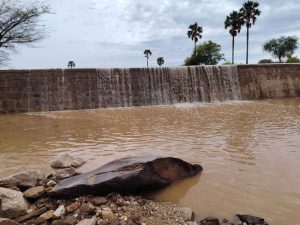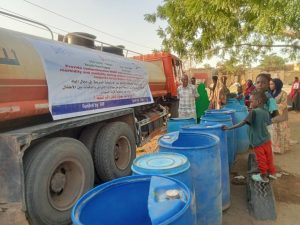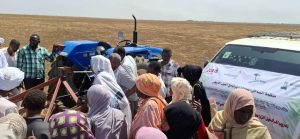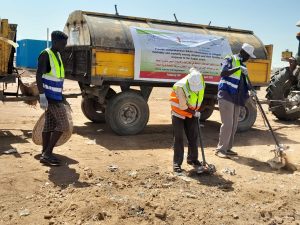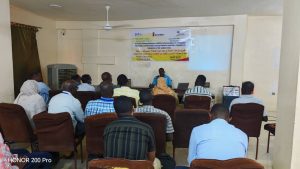| Activities | North Kordofan | South Kordofan | West Kordofan |

Program focus in Greater Kordofan:
SOS Sahel Sudan’s vision is to implement a long-term strategy designed to develop the targeted communities by building their capacities to manage their natural resources, reduce conflict over natural resources, strengthening livelihoods and respond to emergencies. SOS Sahel Sudan is working in partnership with several NGOs, UN agencies and academic institutions including Oxfam, NCA, Concern, FAO, WFP and Dilinj University. SOS Sahel operates programmes across greater Kordofan from field office in Alobied, Kadugli, Muglad, Aldibeibat and Abbasia.
The greater Kordofan program focuses on 5 strategic objectives stated in the SOS Sahel Sudan’s strategic plan. These are: Natural resource management, Conflict reduction, Livelihoods, Capacity building and emergency responses. The ongoing projects those addressing these objectives are:
1. Capacity Strengthening of civil Society Organizations in North Kordofan – funded by EU
2. Promoting Peace over Natural Resources in West Kordofan – funded by UNEP/EU
3. Community-based conflict reduction in South Kordofan – Funded by Norwegian Embassy
4. Water and Sanitation project in South and West Kordofan – Funded by NCA
5. Water and Sanitation Project in Rashad and Abbasia/ SK – Funded by Concern
6. Water project in South Kordofan – Funded by SOS Sahel UK
1) Capacity Strengthening of Civil Society Organisations in NK
This Action is based on four components, namely: 1) institutional and management support for participants CSOs, 2) support for networking and coordination amongst participant CSOs, 3) Support participant CSOs to conduct needs assessments and prioritisation, with a special focus on marginalised groups.4) Support participant CSOs in the areas of natural resource management (NRM) and related conflict reduction activities and service delivery.
The project locations covered 7 localities 4 localities in NK (Bara, Um Rowaba, Sheikan and Alrahad) and 3 in WK (ElNohoud, ElKhewi and ABuzabad).
The target groups are, 35 CSOs in the both N/WK States, the governing bodies, executive committee members, the Sudanese Environment Conservation (SECS) as a partner on the project; four other CSOs as associates. The remaining 30 CSOs are beneficiaries. The 35 CSOs are the targeted of intensive capacity-strengthening throughout the project life and the main participants in planning and delivering actions to promote sustainable NRM and reduce poverty. Activities of this project included:
· Institutional and management support for participant CSOs.
· Support for networking and coordination amongst participant CSOs
· Support participant CSOs to conduct need assessments and prioritisation, with a special focus on marginalised groups.
· Support participant CSOs in the areas of natural resource management (NRM) and related conflict reduction activities and service delivery.

2) Promoting peace over natural resources
Local level conflict, especially over fertile land, water, grazing areas and forest resources has become a defining feature of the social landscape in Greater Kordofan. Chronic poverty and instability linked to conflict, along with a breakdown of environmental governance and a lack of state INVESTMENT in development has placed significant strains on the livelihoods of local communities and has exacerbated environmental degradation (desertification, overuse of water sources, soil erosion, and biodiversity loss). Strained livelihoods and deteriorating environmental conditions, in turn, restrict agricultural productivity and exacerbate competition over resources. Rapid population growth in the region has also placed further pressure on the natural resource base and has overstretched state capacity for service delivery to vulnerable communities.
in development has placed significant strains on the livelihoods of local communities and has exacerbated environmental degradation (desertification, overuse of water sources, soil erosion, and biodiversity loss). Strained livelihoods and deteriorating environmental conditions, in turn, restrict agricultural productivity and exacerbate competition over resources. Rapid population growth in the region has also placed further pressure on the natural resource base and has overstretched state capacity for service delivery to vulnerable communities.
Specific Objectives:
Reduced incidence of local level conflict over natural resources
Relationships over natural resources between local communities and between local communities and government strengthened
This will be achieved through improving access to vital resources through infrastructure rehabilitation, improving accessibility to support services and developing collaborative ways for joint decision-making over natural resources. The project will focus on the development of collaborative, non-violent ways of managing natural resources by establishing stronger relationships between user groups and state authorities and setting up mechanisms for dialogue and conflict resolution. The project will support increased access to vital natural resources; promote stronger civil society institutions; and ultimately contribute to a more participatory system of local governance. These activities will be supported by a national programme of dissemination activities and by working with other actors to replicate and scale up lessons learned from the project.
SOS Sahel’s programme in the project area was initiated in 2010 to address concerns over escalating conflict in the Abyei area between different livelihood groups, resulting in a threat to Sudan’s peace process. The program focused on the development of collaborative, non-violent ways of managing natural resources; the provision of increased access to water; building stronger civil society institutions (particularly for women and youth); and the design of a more participatory system of local governance. The project proved critically important for local co-operation and co-existence, improved awareness of the politicization and propaganda that promoted violence in the past, and supported the community to reestablish traditional, locally-mediated forms of conflict resolution and resource sharing.
Building on long years of experience of providing water infrastructure and services, SOS Sahel has provided critical services along the central livestock migration route between Muglad and Abyei. Misseriyya livelihoods have also been supported through pastureland demarcation and rehabilitation, para-vet training and livestock vaccination, and vocational training for Misseriyya youth. Activities are continuing in the Muglad community to build and train peace committees, comprising representatives of all population groups. Apart from fostering peaceful relations within the project communities, the project has generated unanticipated benefits including the conflict resolution between Massiriya sub-tribes, and the completion of a regional water point survey along the Muglad-Abyei corridor.
3) Community-based conflict reduction in South Kordofan
South Kordofan is one of the areas that are significantly affected by the civil war before CPA and the conflicts that strongly started in 2011 and having it consequences till now. It is observed that many civilian can be seen handling guns when they are moving between the villages and in the markets. This situation made the social environment liable to violence occurrence at any time. It also created lack of trust and tension among the local communities. Based on the previous project reports, most of the local conflicts are resource-based and developing into tribal conflicts. This situation has resulted in:
– Lack of trust among different groups and land users.
– Feeling of injustice among those who are denied access to their land that they own for farming because of insecurity.
– Increased prices for all necessary products due to high cost of transport and frequent high jacking of materials.
– Livestock raisers cannot herd freely due to lack of security in areas around and possibility of livestock looting.
The conflict between groups and users is mainly over the use of natural resources including land, water and rangelands and are resulting from:
– Competition on use of the resources.
– Storage of resources during the time of use.
– Lack of organization on the use of the resources.
Apart from the overarching conflict, farmers and herders are the main actors of the conflict in the project area. Therefore, any intervention has to be sensitive to the interest of these two main actors.
The overall objective is:
Pastoral and farming communities in South Kordofan enjoy peaceful and prosperous livelihoods through shared management of natural resources.
The programme aims to build lasting peace and prosperity in these war-affected areas, by using community-based conflict reduction measures and by supporting pastoral and farming livelihoods.
Project outputs and activities:
Output 1: Improved protection and support for pastoralist herds and grazing land.
The second highest priority activity recommended by previous evaluation is the Protection and rehabilitation of natural pasture. Where the grazing areas are degraded and encroached by farmers, encroachment of animals onto farmland is more likely, and this leads to crop damage, confrontations, retaliatory burning of pasture, and so on. Pastoralists need rehabilitation of their grazing areas and mutually agreed routes along which they can move their herds, with defined resting areas.
Key areas of grazing land that have become degraded along the recognized livestock corridors will be rehabilitated through reseeding and the arrangement of community agreements to leave them unused, to recover. Related activities to protect grazing land will include opening of firebreaks, to protect forests and pasture (from deliberate or natural setting of fires), and pest control measures (where insects are damaging pasture, for example) at two key sites. Where there are very large congregations of animals, access to community para-vet services and vaccinations will help to reduce disease. The project includes activities to train 15 community para-vets in year 1 and 15 in year 2, and to provide transport and logistical support for 3 vaccination campaigns per year (the vaccines themselves will be provided by the Government.)
Output 2: (Capacity building), 500 key individuals (including women and youth) and 9 CBOs per year trained in natural resource-based conflict management and livelihood options.
Training for key individuals in conflict management skills will help communities to defuse potential conflict situations. These individuals include traditional leaders, women, and youths, and the training will focus on different approaches to managing conflict: for example, via negotiation and mediation. SOS Sahel has partnerships in delivering conflict training with the Peace Centre of Dilling University in South Kordofan and with the Social Peacebuilding and Peaceful Co-existence Committee in Kadugli.
Conflict forums will bring together representatives of competing groups and other key actors such as local government. With skilled facilitators provided by SOS Sahel, issues of joint management of natural resources and other conflict triggers can then be discussed openly, and solutions sought.
Where civil society is weak, SOS Sahel plans to provide training and capacity building to local CBOs in order to strengthen them (financial and management training for CBOs, local leaders and unions are recommended)
For example, committees will be formed and registered to manage the use of local water sources, livestock corridors and grazing land; peace committees will monitor conflict risk situations; fire committees will monitor the causes and damage done by fire outbreaks, and so on. These structures will provide a framework which allows communities to sustainably manage the natural resources upon which they rely.
Native administration and tribal leaders will be training on negotiation skills to restore peace and promote co-existence between tribes and sub-tribes. 4 training workshops (one in each of the 3 targeted localities and one in Kadugli the capital of the state) will be conducted over two years.
More vocational training for youth is recommended by the evaluation report. Total of 30 youth selected from both farmers and pastoralists groups will be trained in Elobied technical school. This will promote livelihood options for youth and help them to engage on community affairs such as conflict reduction process.
Output 3: Reduce conflict over water resources through improved water supply at flashpoint sites for 15,000 people and their animals.
Rehabilitation of water sources has consistently been the highest priority activity raised in consultations by both pastoralist and farming communities. Access to sufficient water during the dry season is essential to support both farming and pastoralist livelihoods. However, water infrastructure is expensive, and it is vital to provide appropriate, sustainable technologies and train water committees to manage them.
Hafirs (excavated reservoirs) are able to store water long into the dry season, but require periodic re-excavation as they gradually fill with sediment. SOS Sahel has constructed numerous hafirs in these regions.
Sandy river beds are a natural water source – relatively clean water can be obtained from ‘scoop wells’ in the sand. Sand dams are a low-cost, sustainable way to increase water availability in river beds, and are particularly suitable for the steeper terrain of the Nuba Mountains. SOS Sahel has recently completed successful three sets of sand dams, one near Kadugli with a community of returnee Nuba farmers, one in Tourleg area and one in Rashad locality for use by both farmers and pastoralists.
The planned activities, which may be adjusted depending on the hydrology of the sites investigated, are to construct or rehabilitate two boreholes/water yards in the fist year, and one set of sand dams in the second year.
The key point is to take into account the existing water sources used by the community and their capacity to manage additional water infrastructure. Community involvement in the form of water management committees can make the difference between a new water source that reduces conflict and a new water source that worsens conflict.

4) Water and Sanitation project in South and West Kordofan
Project Goal:
The overall objective of this project is, to contribute to wellbeing and livelihood of vulnerable communities in South and West Kordofan States.
Specific Objectives:
Sustainable access to water supply for settled villagers and nomads in Alqoz (SK), Abu Zabad and Elkhewi localities (WK).
delivering hygiene promotion services to improve community/school sanitation in the three target localities
Description of Proposed Activities:
· Upgrading HP to mini water yard: This activity aims to access sufficient water for the targeted and reduce time and efforts for the community esp. women and children. The area will be selected according to the findings of a pumping test planned to be conducted by SOS to identify water yield.
· Rehabilitation Of existing hafeers to provide sufficient water for both human and animals. The plan includes expansion of Hafeer size, fencing and inlet and outlet pipes.
· Conduct stakeholder’s workshops to be facilitated by Rural Water Corporation (RWC) and local Public Health. Relevant agencies will be invited to discuss the current water and hygiene situation and to clearly divide roles/responsibility among stakeholders to optimize resources and ensure cooperation and coordination between all actors. From these workshops an agreed forum expected to be emerged for further discussion on these issues. The participants include RWC, WES, UNCEF and targeted communities. This activity expected to come up with recommendation that would help in the future intervention.
· Geophysical studies: The aim of this activity is to identify sites for drilling in the basement complex and in the area where the land is not easy to be explored for water except by test devices. 6 sites will be selected for the studies, 3 at each locality. The findings of these studies expected to help in the future intervention for SOS and other actors. The results will be shared with community and concerned agencies.
· Hygiene sessions: This activity includes awareness sessions, presentation, role play, video show. Some materials for cleaning will be distributed like soap, chlorine etc., sessions will be facilitated by SOS hygiene promotion officers and community mobilizes. Men, women, youth and children will be engaged.
· Construction of school latrines: school latrines will be constructed in each locality with aim of improving school sanitary situation. This activity will be going along with hygiene awareness in the schools and formation of school hygiene clubs. The construction will be contracted with local building engineer.
· Capacity building of water committees and relevant community structures: This activity consist of two parts, managerial part includes training on management of water sources, bookkeeping, holding meeting, establishment of tariff, etc, and the second part will be devoted for operation with the aim of providing basic skills/knowledge for the trainees to meet any basic malfunction of these resources.
· Training workshop in conflict reduction around water points. This activity is focusing in raising awareness of the targeted communities to jointly manage their water resources in a better manner to avoid tension/conflict, and it will be implemented alongside with hygiene awareness around water points for sanitary purpose, and will be facilitated by Dilling Peace and Development Center.
5) Water and Sanitation Project in Rashad and Abbasia
Project Goal:
The overall objective of the project is to contribute in reduction vulnerability and suffering among conflict-affected people and IDPs in Rashad & Abbasia and Taadamon localities, SK State, through improving access to water and hygiene promotion services (WASH).
Stakeholders:
· The potentil stakeholers will be WES, the technicl government body responsible for water sources construction and rehabilitation beside cpacity building for water sources management. WES will be leading on technical issues of the upgrading of HPs to mini water yards under management and supervision of SOS Sahel.
· SOS Sahel team in corrdination with the local public health services department will implement hygiene activities.
· HAC, will facilitate team movement and verfying safety and security situation for the targeted locations and give advice.
· CONCERN, will be providing fund and technical advice through its WASH focal point in Kadogli and monitor the project implementation as well.
· SOS Sahel will be responsible for overall supervision , management and reporting.
Project Desciption and planned activities:
Water:
Access to water is considered as major challenge in SK due to successive conflict and instability in SK State. Lack of water is a driving force of conflicts between the users in Abbasia and Rashad localities. The problem of water sources break down and poor management is clearly impacted and reflected on the quantity and quality of water supply as the population in area has proportionally increased by new comers (IDPs).
The project will target areas where conflict affected people and IDPs have been accommodated with host communities. The scarce of water will be addressed through rehabilitation of HPs, upgrading of HPs to mini water yards and support operational costs for water yard to meet the water need of the targeted population.
The work will be done in close coordination with WES; (the technical government body) to do the work. SOS Sahel will be responsible of managing and supervising overall implementation process. Local leaders are playing key role in mobilizing community to contribute and to sustain this activity.
Hygiene:
Hygiene promotion is also very poor among those targeted communities. The hygiene activities will be planned to reduce this severe suffering from lack of services/ sanitation facilities as well as poor environmental living conditions. In order to improve community hygiene promotion; awareness sessions are conducted to raise/train the community on hygiene issues including safe waste disposal. The project is targeting men, women and children in the main villages. Also environmental health awareness sessions are conducted to raise the awareness of the targeted communities on different hygiene and health issues. The sessions will be facilitated by local public health and WES under direct supervision of SOS Sahel implementing team. The package will cover personal hygiene, water hygiene, environmental hygiene, food hygiene.
6) Water Projects/ Sand Dams
The aim of the project is to provide improved dry-season water supplies for drinking, watering animals and for farming around main villages in South Kordofan, by constructing 2 -3 sand dams across each suitable seasonal river. The dams will provide clean water for decades to come, improving local food security and reducing the incidence of conflict over water.
South Kordofan suffers from dry-season water shortages, which often lead to local conflicts over water sources. The rains end around November, and by January many wells have run dry. The village of Tortang, in Rashad Locality, get water from the local river, and then from sand in the river bed after the flow dries up. At the height of the dry season, they must dig down 4-6m to find water.
Construction of sand dam in the Tortang village
Construction of the sand dam may only take place during the dry period: November to March. The local authorities granted permission for the dam to be constructed. Construction of the first dam took place over a five-week period from the end of January to the beginning of March 2014.
One important purpose of the community evaluation was to mobilise the villagers to participate in the construction of the new sand dam.
The process of construction followed the following stages:
1. Conduct a feasibility study
2. Mobilise the community to participate
3. Demarcate the foundations and digging
4. Stone collection (this was mostly prepared in advance)
5. Wall construction
6. Adding a concrete layer
7. Plastering the wall
